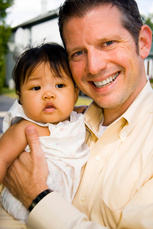Contact Sheri A. Mullikin, Maryland Adoption Attorney for a
Consultation: (240) 394-9544
Consultation: (240) 394-9544
International Adoption
International adoption involves the adoption of children located outside of the United States. Most international adoptions are completed through an adoption agency located in the United States. Adoption agencies will have different foreign country programs and their own set of requirements for who can adopt and which children are available for international adoption, in addition to those required by the country program chosen by the adoptive parents.
The rules and process of international adoption have changed a great deal in recent years with the passage and implementation of The Hague Convention on the Protection of Children and Co-operation in Respect of Inter-Country Adoption. This international agreement establishes international standards of practice for intercountry adoptions. The United States signed the treaty in 1994, and the Convention became law in the United States in 2008. The Convention applies to the United States and all countries that have joined it (Convention countries). The Convention provides certain safeguards, not only for the children, but also for prospective adoptive parents. For example:
Pre-Adoption Process
Prospective adoptive families must complete a home study that meets the requirements of the adoption agency, as well as United States immigration laws and laws of the foreign country. After the completion of a home study and a dossier that is submitted to the foreign country, prospective adoptive parents will wait for a referral to a child eligible for adoption. They will be provided with information that can include pictures of the child and medical background information on the child. Although each country and program is different, adoptive parents usually do not receive much background and medical information about the child and their birth family. Upon acceptance of a referral, an adoption "match" is made.
The rules and process of international adoption have changed a great deal in recent years with the passage and implementation of The Hague Convention on the Protection of Children and Co-operation in Respect of Inter-Country Adoption. This international agreement establishes international standards of practice for intercountry adoptions. The United States signed the treaty in 1994, and the Convention became law in the United States in 2008. The Convention applies to the United States and all countries that have joined it (Convention countries). The Convention provides certain safeguards, not only for the children, but also for prospective adoptive parents. For example:
- only adoption agencies that have been evaluated and approved / accredited may offer certain adoption services for Convention adoptions unless the organization or individual is operating as an exempt provider or under the supervision of an accredited or approved adoption service provider;
- accredited adoption agencies must itemize and provide written documentation of fees and estimated expenses associated with the adoption, when adopting from a Convention country, and unforeseen expenses may only be recovered under specific circumstances; and
- all children adopted from a Convention country will receive a Hague Adoption Certificate or a Hague Custody Declaration from a U.S. consular officer upon satisfaction that the adoption was completed in compliance with Convention requirements.
Pre-Adoption Process
Prospective adoptive families must complete a home study that meets the requirements of the adoption agency, as well as United States immigration laws and laws of the foreign country. After the completion of a home study and a dossier that is submitted to the foreign country, prospective adoptive parents will wait for a referral to a child eligible for adoption. They will be provided with information that can include pictures of the child and medical background information on the child. Although each country and program is different, adoptive parents usually do not receive much background and medical information about the child and their birth family. Upon acceptance of a referral, an adoption "match" is made.

Travel and Finalization of the Adoption
After a match, the adoptive parents will usually travel to the country to finalize the adoption. A few countries do not have travel requirements; however, that is an exception. Some countries have specific requirements on how long the adoptive family must stay in the country before the adoption can be finalized. In most international adoptions, the adoption is legally finalized in the foreign country; however, in some cases, the child will be placed in the custody of the prospective adoptive parents and the adoption finalized in the United States.
Considerations
Many adoptive parents consider it a benefit that the child has been abandoned and is in an institutional or orphanage setting. Some adoptive parents prefer a "closed" adoption and may choose to pursue an international adoption because it is unlikely that the adoptive parents will have much, if any, contact with the child's birth parents. Additionally, there is little risk of a birth parent appearing during or after the adoption process and attempting to parent the child. On the other hand, one of the downsides to international adoption is that little is usually known about the child's family and medical history because the child is an orphan or was abandoned.
Resources
United States Department of State, Bureau of Consular Affairs:
After a match, the adoptive parents will usually travel to the country to finalize the adoption. A few countries do not have travel requirements; however, that is an exception. Some countries have specific requirements on how long the adoptive family must stay in the country before the adoption can be finalized. In most international adoptions, the adoption is legally finalized in the foreign country; however, in some cases, the child will be placed in the custody of the prospective adoptive parents and the adoption finalized in the United States.
Considerations
Many adoptive parents consider it a benefit that the child has been abandoned and is in an institutional or orphanage setting. Some adoptive parents prefer a "closed" adoption and may choose to pursue an international adoption because it is unlikely that the adoptive parents will have much, if any, contact with the child's birth parents. Additionally, there is little risk of a birth parent appearing during or after the adoption process and attempting to parent the child. On the other hand, one of the downsides to international adoption is that little is usually known about the child's family and medical history because the child is an orphan or was abandoned.
Resources
United States Department of State, Bureau of Consular Affairs:
- Searchable list of Hague Convention approved and accredited adoption service providers
- Searchable list of country-specific adoption requirements
- Visa requirements and adoption forms


